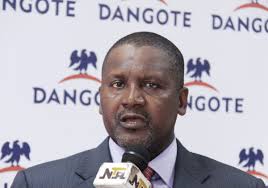Shareholders of Dangote Cement were full of praises for the Board, Management and staff of the company after approving the dividend payout of N144.8 billion, which translated to N8.50 kobo per share as against N8 per share, that was paid in the corresponding period of 2015.
Speaking at the company’s annual general meeting (AGM), held in Lagos, President of Amiable Shareholders Association of Nigeria, Festus Akano said the shareholders were pleased with Aliko Dangote and his team. He said for the company to still pay a robust dividend despite the recession in the economy, which also affected their operations shows the doggedness and the fighting entrepreneurial spirit of the Management.
He said “We are very happy and pleased with this result. 2016 was very tough with the recession and fluctuation in the foreign exchange market which the Chairman also said affected their operations, but despite all these challenges, the company was still able to pay us a very good dividend, better than last year, and even gave us hope of better returns on our investments in the years to come.
This is very commendable and it is only a company like Dangote Cement that can achieve this laudable feat.”
Chairman of the company, Aliko Dangote while presenting the reports to the shareholders said the company’s strategy in every country of operations is to be the leader on costs, quality and service. He said the company build large, modern, highly efficient plants that combine the latest equipment from Europe, China and beyond to enable it make higher-quality cement at lower costs, thereby giving it strong competitive advantages.
According to him “Looking back at the 2016 financial year, I am pleased to report that our cement sales volumes increased by 25.0 per cent to nearly 23.6Mt. Of this, almost 14.8Mt was sold in the Nigerian market. Revenues increased by 25.1 per cent to ₦615.1B, of which 68.3 per cent was generated in Nigeria (excluding eliminations) and 31.7 per cent from Pan-African operations. Our earnings before interest, depreciation and amortisation (EBITDA) decreased only slightly, to ₦257.2 billion, with Pan-African operations contributing ₦26.5 billion, excluding central costs. Earnings per share increased by 4.5 per cent to ₦11.34.
As I have already stated, the Board proposes a dividend of ₦8.5 per 50 kobo share, subject to your approval, to be paid on 26th May 2017 to shareholders”
Another shareholder, Akin Akinwumi, from the Progressive Shareholders Association urged the Management to give a bonus and a better dividend in this 2017. He said, the company should do all within its power to give bonus issue.
He said: “We thank the Management for giving us this dividend but we are appealing so strongly that bonus issue should also be considered. For some of us, we prefer a bonus to this dividend and we know it can be done.”
He expressed optimism on the pan African plants, especially now that the Plants are contributing significantly to the turnover of the company. “It is a statement of fact that we are lucky to be shareholders of this great company. If you see what our subsidiaries across Africa is contributing to the turnover, then you will understand what I am talking about. I am very happy and our members are upbeat for the future, knowing fully well that it will only get better.”
Group Chief Executive Officer of the company, Onne van der Weijde, revealed that the expansion strategy of the company yielded fruits last year when Nigeria was in recession as the Plants across Africa contributed significantly to the company’s turnover.
He said “… We can see how that strategy has helped us in a time that our main market of Nigeria is facing a recession, high inflation, lower consumer spending and a shortage of foreign currency to fund essential imports. But outside of Nigeria we’ve had operations that have now been running for more than a year and they are experiencing good growth and improving profitability, so we have managed to offset some of those topline pressures in Nigeria with revenue streams from countries in very different parts of the continent.
“Furthermore, those Pan-African operations are helping to generate foreign currency for the Group, so this shows how a long-term decision to diversify can help with a short-term pressure like an illiquid currency market in Nigeria”

